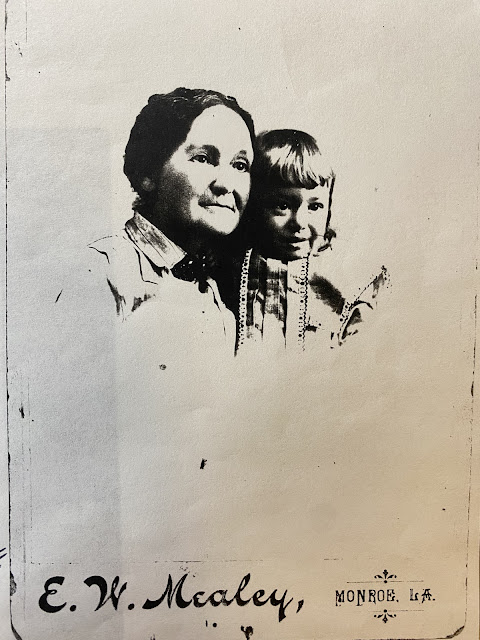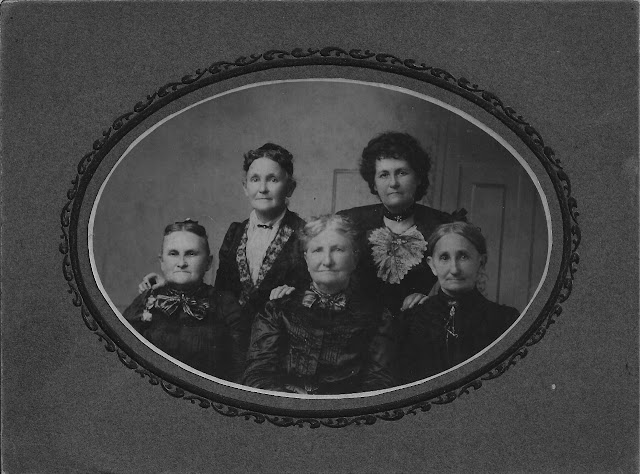Home of Rev. Elias George, built in 1850. Photo taken in 2011.
19 June 1896 Lou Tompkins with her grandson, Raymond G. Wilkins, (son of Myrtle Louise Tomkins Wilkins)There's a breaking place at this point, and then the following title:
THE MEMOIRS OF LOUISA GEORGE TOMPKINS PART 5: PLANTATION LIFE
After the death of my mother, father seemed so disconsolate and broken in spirit, that his friends and older children encouraged him to find a companion for himself and a mother for his children. He finally wrote to Mrs. Ross,---a very excellent lady of character, culture, and refinement, reared and educated in Richmond, Virginia and who was then living on a plantation that adjoined our former home in Alabama. This lady and her sister, Sarah and Mary, were both widows; Mr. Bryant, husband of Mary, had died soon after moving to Alabama, and Mr. Ross, Sarah's husband, died not long after we came to Louisiana. It was satisfactorily arranged between my father and Mrs. Ross,---and the following spring (1852), father went back to Alabama and they were married. It took two or three months to arrange her affairs and get all things in order for the moving to Louisiana. As the sisters would not be separated, transportation for the two families had to be made and each had many slaves and several children. It was a big responsibility but it effectuality diverted father's mind from his own personal grief. Finally, the second caravan left the same neighborhood for Louisiana, similar to the first which had gone four years before,---with many vehicles and covered wagons. All arrangements for homes and land had been made previously and were awaiting their arrival. One afternoon, when Sue, Jane, and I were attending school, a handsome youth, about 18 years old, came into the classroom and asked for the George sisters,---introducing himself as Jim Ross, our stepbrother. On looking out of the window, we were surprised to find the street lined with carriages, buggies, wagons, and horses. The young people had come in advance of the wagons, while my father's wife and her sister were in a carriage to the rear. My father was on horseback and there were several others (bottom of original page cut off). Our teacher excused us and we went out to meet our new relatives who insisted that we go home with them, which we were only too delighted to do. We didn't even ask permission of our aunt, with whom we were boarding, but sent word where we were. Father was so busy seeing that the negroes were settled, that he did not know until that night that we had come home with the crowd. When he finally came into the house, three eager girls unexpectedly threw their arms around him. Imagine our amazement when he did not respond, but seemed dismayed at our presence. He said that we must return to school early in the morning, because there was cholera among the negroes,---contracted while passing through the Mississippi swamps. A negro woman had died of it that night just as the wagon in which she rode, stopped at the gate. The next morning before breakfast, a girl 12 years old, came in and said she was sick. Father examined her and gave her the cholera remedy, but at noon she was dead. The place was immediately quarantined. In two weeks 16 negroes had succumbed. After that, there were no new cases, but it was many weeks before we were permitted to go home again. When, once more, things were running smoothly on the plantation, work began with speed on the new house in Marion which father had stopped building after mother's death. During that period, we resumed our former custom of weekend visits to our country home and this gave us much pleasure. We were always taken back on Monday mornings, for school began at 8 a.m. and closed at 5 p.m., with two hours for recreation. We liked horseback riding, and by request, they would bring horses with side-saddles for us to ride home. Ladies were never seen to ride astride then, but many became fine equestrians, even running through the forest in a deer or fox chase,---the horse leaping over logs or anything that happened to be in his way. We sometimes brought home two or three school mates and what jolly good times we had romping all over the place. The younger children played " Ring-around a rosy" , "Blind fold" , " Puss-in-the-corner" , and" You can't get out of here" ,---and there were other games that I don't recall. The last mentioned game was played by six or seven forming a circle by holding hands; one was the prisoner within the circle jail, out of which he was to break if he could. While trying to escape he would sing, " I'll bet you a dollar, I'll get outer here!" When he did, the one from whom he broke had to be the prisoner. During dear mother's life, we were allowed to romp and play with the children of the house servants. Although we worked and played together, the colored children were obedient and kind, and we were taught to be just and kind to them. My mother, (Miss Ann, as they called her) settled any differences which arose between us. As I see it now, she was impartial in her judgement, but then, I thought she was partial to the colored children. Each child over six had his little chores and appointed tasks, according to his age, which had to be done before he was allowed to play. Our little hands kept the knives, forks, and other silverware shining and bright; scoured the milk-pans, buckets, and dippers, and all the tin and copper vessels. Also, the children kept the yards clean. May 1st was always looked forward to with great pleasure, for on that day we all, white and colored children alike, were permitted to leave off our shoes and stockings for the first time since the last early autumn, and what joy was ours for this privilege. As we grew older and started school, the pathway between servant and mistress became more marked,---the servants took their places in deference and respect. At the same time, our love and childhood associations bound us together in life-long affection and friendship. The new home in Marion, with all the outhouses for the servants, was at last ready for occupancy. The house was commodious with parlor, dining room, six bedrooms, each with a fireplace, and every convenience known at that time. Father had a large hall built over the kitchen and a spacious storeroom. Steps to this hall were built from the outside to a porch above and the hall was furnished with chairs, tables, and beds, and many extra mattresses which were stored away for use during the occasions of summer church revivals, school concerts and exhibitions, and examinations, when people came from far and near. At this time, there was not only a large family of our own, but father, having a cordial, hospitable nature would never turn anyone away even if he'd been consulted, and the public seemed to think "Parson George" has established a wayside inn with a " Welcome to All! without money and without price" , because he had a big house and plenty of servants. When we moved in, the furniture which had been purchased in New Orleans was delayed in its delivery, and the family had to make use of whatever furniture that was at hand. The floors were bare and rooms comparatively empty and the echoes that resounded from the plastered walls and the uncarpeted stairways, were fearful to little children, for the negroes, who were very superstitious had taught us to believe in ghosts,---and when going up to our bedrooms at night, we could easily imagine that "spooks" inhabited every corner. It was a long time before I overcame this fear. Our home was located in a beautiful, level grove of oaks and pines. There were 25 acres. Five-hundred yards in front of us, with no buildings to obstruct, was the school. To the rear of our dwelling, the land sloped down to a bold spring and a running brook which was about four-hundred yards away. Outward surroundings rapidly improved; the grounds were laid out in oval, diamond, and star-shaped beds and there were various kinds of mounds and frames for vines. Cape jasmine hedges sent their fragrance all over the village which was steadily assuming the proportions of a town with two churches, and several stores. One church, the Baptist, of which father was the pastor, was built on his land at the end of the garden. A gate near the side entrance of the house opened into a beautiful grove of oak trees in the midst of which was the church with its white copula and bell extending a welcome to all. A large orchard of peaches, apples, plums, figs, and pears had been planted in the back of the servants' houses; and to the right of the orchard was the horse-lot, corn-crib, and stalls. In front of these were the carriage and buggy houses, in which were kept the saddles for men and women. Our home was full of merriment and joy with young people often meeting for a social evening. My sisters and step-brothers, with piano, violin, and flute, added by other members of the family, never lacked for entertainment. It was necessary to keep quite a coterie of servants. Their individual duties were as follows: two cooks, Ann and Emoline; dining room maid and helper, Easter and Rose; seamstress, Harriet; Laundress, Louisa. Mother's maid, Leta, a girl of 15; Linn, Bud' s (Elias, Jr.), and my maid, Rose; gardener, Carter; and two 15 year old boys, Sam and Lex to keep fires, attend horses, and do other chores. In the summer of this year, there was a big Baptist meeting held at Concord Church which was two miles from town, the oldest meeting house (so-called church) in that part of the country. Father and other Baptist ministers were in charge. The greater part of Marion and the surrounding country attended all-day services, with dinner on the grounds. I became very much interested in my soul' s salvation at this time. I learned from God's Word that I must repent my sins and " be baptized for the remission of sins". I made up my mind to obey God and was baptized according to Matthew 3:11-13.
No date but before 1902: Standing L to R: Sarah Louise George Tompkins, Melinda Elliot "Linnie" George Dirking. Seated L to R: Mary Jane George Cammack, Elizabeth Ann George Gaines, Susan Sophia George Thomas.
And there's another chapter to come...




No comments:
Post a Comment
Looking forward to hearing from you! If you leave your email then others with similar family trees can contact you. Just commenting falls into the blogger dark hole; I'll gladly publish what you say just don't expect responses.